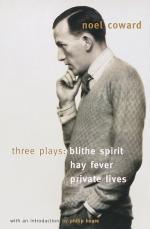|
This section contains 1,943 words (approx. 5 pages at 400 words per page) |

|
Kreger is a doctoral candidate at the University of California, Davis, and has served as a guest lecturer at the Johannes Gutenberg University in Mainz, Germany. In this essay she discusses how Coward's comedic touch in Hay Fever reveals the artifice of both social and theatrical conventions, putting a uniquely humorous spin on the anxiety over loss of meaning expressed so seriously by many of his modernist contemporaries.
"None of us ever mean anything." So the character Sorel Bliss describes her family in the second act of Noel Coward's 1925 comedy of manners Hay Fever. In context, her words explain the Blisses' endless play-acting, the cause of the work's humorously chaotic situations. Yet her statement also echoes the cultural anxiety expressed in many other forums during the post-World War I era, a time when many artists articulated concerns about the increasing hollowness and meaninglessness of the modern world...
|
This section contains 1,943 words (approx. 5 pages at 400 words per page) |

|




